'One man hadn't been outside in five years - until he came out to see Sigurd'
David Carr meets a trainer and a racehorse doing their bit for the community
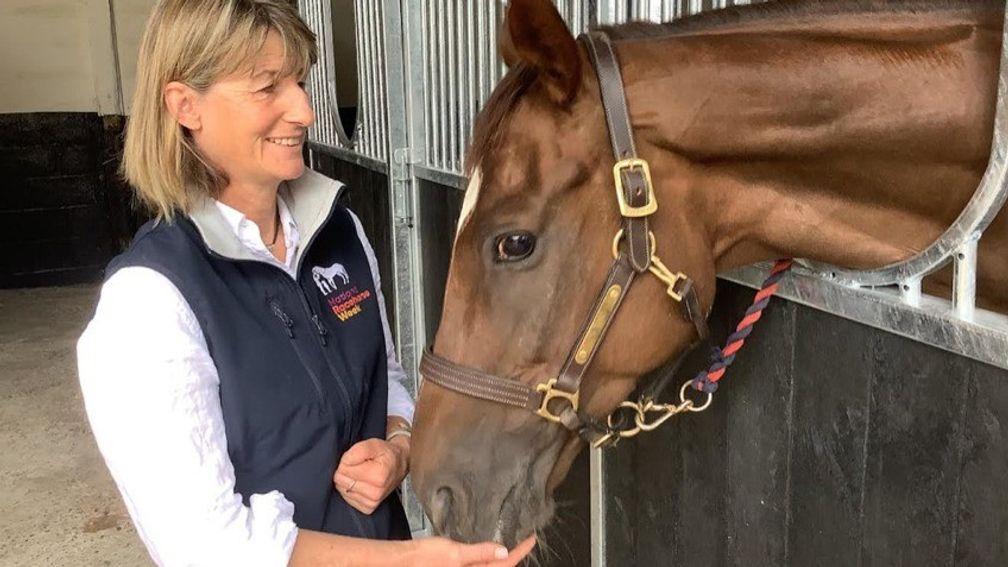
Meet the true champions of our game, the real heroes who are leading the fight for our very survival.
If that sounds a bit extreme, think of all the sports coverage in the media nowadays where racing is not a dirty word, it is not any word at all any more. We are slipping out of the national conversation, with declining spectator numbers, difficulties in finding staff and a falling share of the country's betting turnover adding to the unease about our future.
How do we fight back? Well, to adapt the famous phrase: if you want something done, ask a busy woman – and her horse.
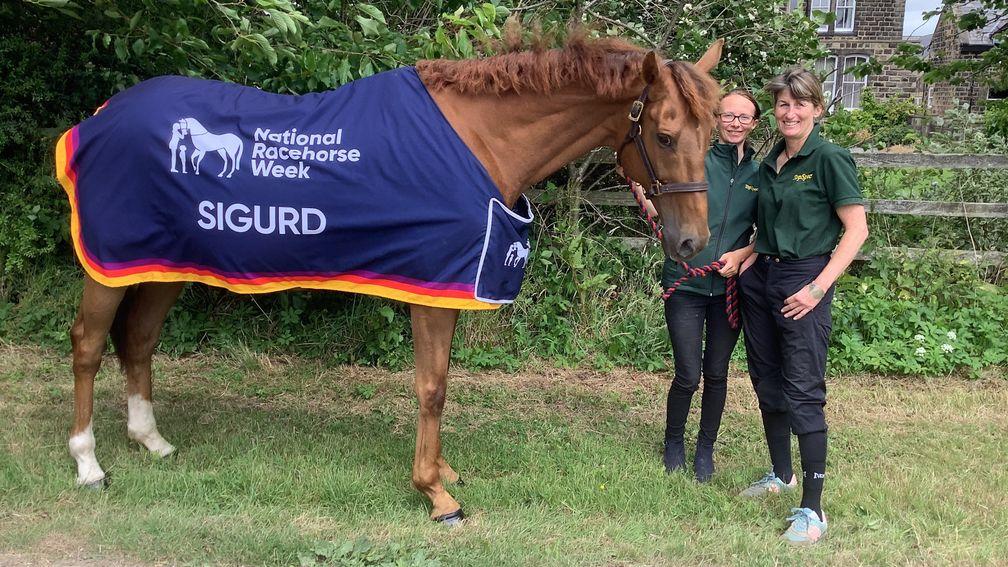
With a 24-hour delay, we are now into the second National Racehorse Week, the brainchild of Richard Phillips which aims to showcase all that is good about the sport and its people; to get the message out to places that other campaigns have failed to reach.
Superstar trainers who have spent their whole lives racing and horses worth far too much to risk taking them into public spaces are not necessarily the ones to spread the word to the uninitiated.
Rather, you want someone who has learned their love of the sport and knows how to sell its attractions; someone people can readily identify with and who was keen to get hands-on and do her bit as soon as the call came.
Jo Foster, who has trained at Brookleigh Farm, Burley in Wharfedale near Ilkley, for 20-odd years, has always been a willing volunteer, whether it be carol singing for the homeless in the village at Christmas or dressing three-mile chaser Houndscourt up for National Bobble Hat Day in aid of the NSPCC a few years ago.
She was truly grateful for racing's safety net after breaking her back in a fall on the gallops in 2017, spending a long time in rehabilitation and writing movingly in the Racing Post about her battle with depression.
"It definitely changed me and the way I look at life," she says now. "I realised I wanted to use my brain cells to give something back. Racing Welfare and the Injured Jockeys Fund were so brilliant, we're so well looked after in this industry. Once you experience something, you know what people need and what helps others.
"As soon as Richard Phillips said this is what we want to do, my instant reaction was that we've got to get out there and do it."
And she meant get out there. Not just open the stable doors and hope non-racing folk might pop in and see what it was all about.
"If they were trying to get to people who aren't into racing, the best thing is to go out and show them," she says.
"The people who go to an open day are generally already interested in racing. You're selling to the converted.
"There are lots of people who can't get anywhere and Covid meant that people were struggling, so I thought it would be good to go to more vulnerable people."
Another task for a busy woman who already combines training with running a dog-field business, writing a column for the Yorkshire Post and farming. On the day we speak, she is fresh from a fourth straight night of chasing bullocks, strong young animals who have reacted to their parched pastures by jumping into nearby fields – they really do think the grass is greener on the other side of the fence.
Yet a suggestion that taking a horse out to meet the public must be hard to organise is met in a kindly sceptical fashion: "Is it?"
A year ago this week Foster took staying chaser Sigurd and his Shetland pony friend to the Abbeydale residential care home in Ilkley, where they proved a huge hit.
"It's animal therapy," says Foster. "It's a change, it's stimulation and it's company. It makes them feel they are someone, they do exist and are part of society. That's what's really touched us.
"The elderly are the most discriminated against in our society, they are ignored. But they come alive, it sparks memories and it's a wonderful reaction.
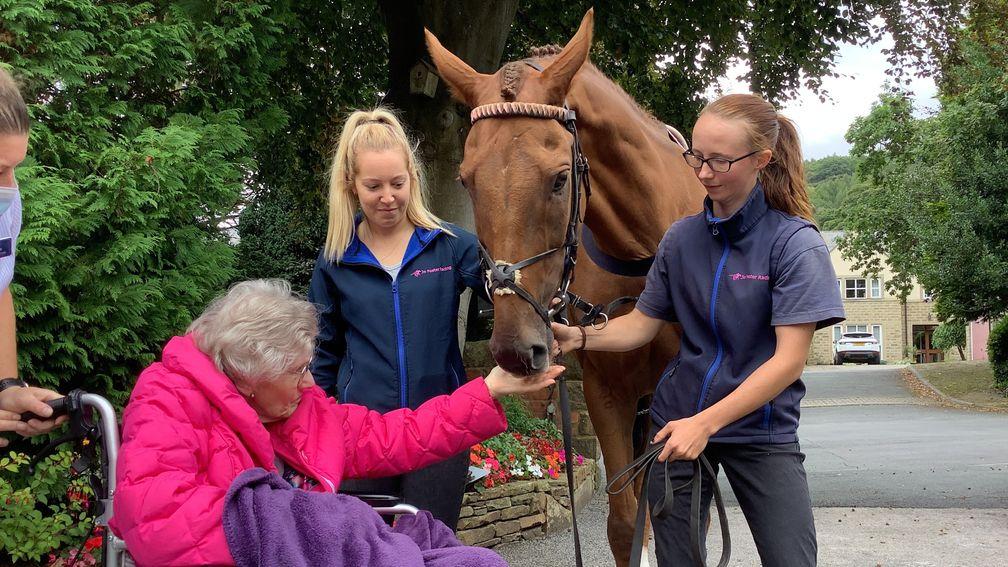
"A lot have dementia and they get stimulated by touching the horse. There was one man who had not been outside since he arrived at the home five or six years ago – until he came out to see Sigurd. It can be a tough day, but it's very moving."
That was followed by visits to other care homes and, crucially, to local schools.
"The young kids get so excited and they're like sponges, soaking up everything," says Foster. "It's education with enthusiasm. With the older kids we bring the equiciser and they talk to my staff, who are not much older than them and can tell them about working with horses.
"Everybody is short-staffed and we need to get out there and encourage people to do the job. A lot of kids go to the racing school just because they don't know what else to do, they kind of fall into it – we need to get more of them keen to get into racing by showing them what it has to offer."
Last year's missionary work means Foster and Sigurd have been front and centre in the promotion of National Racehorse Week in 2022. But the trainer stresses: "He is the figurehead, not me. He deserves to be, he's done a lot of good. He's incredibly laid-back, sensitive without being sharp. He's just got the most gentle nature.
"We take a little pony along as well because he can go into the bedrooms and into the classroom, so those who can't get out to see us, who are perhaps bed-bound, get a touch."
If anyone should have the zeal of the convert it is Foster, 49, who came to racing relatively late in life after starting out with ponies at her parents' farmhouse next door to where she now trains.
"I showjumped until I was 21," she says. "I read Jilly Cooper's Riders 14 times and I had Harvey Smith on my wall growing up! I won the Yorkshire young riders' title for a couple of years, but it ended up being too expensive and it was obvious that I wasn't good enough.
"You needed billionaires to be backing you or a big enterprise. However much I loved it, it was the wrong route to go."
Getting into hunting took Foster to a local point-to-point, and she says: "I thought, 'These guys don't look very professional, this looks like fun.'"
That 'fun' included 75 winners, three Yorkshire titles plus the joy of a five-times broken nose, a ruptured spleen, a punctured lung, being airlifted from Market Rasen one day and a career ended when ruptured tendons in both thumbs made her realise she couldn't get the best out of her mounts.
Hence a switch to training, though not without any huge ambition to go with it.
"I do it because I love it," she says. "I don't do it to get bigger and bigger. We tried expanding about ten years ago and it was hell. We got up to 22 or 23 horses and it was just awful. I couldn't look after the horses and the staff like I wanted to."
Looking after the staff is key as Foster deliberately employs more than strictly necessary so that they have the time to bring on local youngsters – such as Sam Drake, now a successful trainer down the road in Guiseley under her married name of England.
"I'd known her since she was a baby and she's always been a grafter," says Foster. "I'd had a real hunt on finding people to help me when I started pointing, so I was determined to help others and I got a real buzz from watching Sam win races on our horses.
"You don't go into training thinking you're going to make loads of money. You know it's going to be a load of hassle with heartbreak along the way, but you do it for the love of it. Like farming, you've got to love it as there are so many hard times.
"The important thing was it paid for having more staff than I needed, so I could spend time training them. There would always be one person who was learning and being brought into the racing world; that's what I've enjoyed in the last few years."
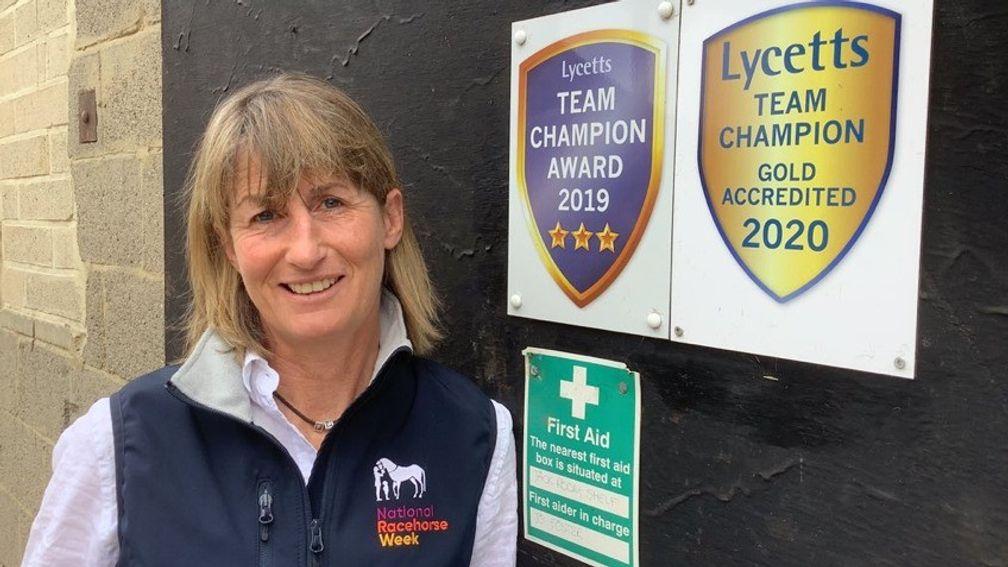
The cost of living crisis is making things much harder and Foster, who has ten horses in work at the moment, admits: "I suspect I could well be payrolling the business this year to keep it going. I'll carry on as long as I can, but I'm not a charity. But it's a brave person who can give up. It's far easier to carry on because it's safe.
"So long as I can make it pay, I'll carry on as long as I can; it's part of my life and it's who I am."
Part of her determination to fight for racing's cause is what she sees as the failure of the sport's authority to do so.
"I think the BHA are embarrassed about racing," she says. "Like a lot of trainers, I feel that they are just apologising for the sport rather than telling everyone how great it is, and they shouldn't have to do that.
"Stop feeling guilty about it. There is nothing to apologise for, it's a great industry. Millions of us would be lost without it."
Hence, Sigurd will be visiting two more care homes and two more schools this week, as well as entertaining two groups of Young Farmers, though none of it will interfere with a racing career that saw the ten-year-old record his sixth win at Wetherby in March. Indeed, Foster reckons the extracurricular activities are a benefit to his performances on the track.
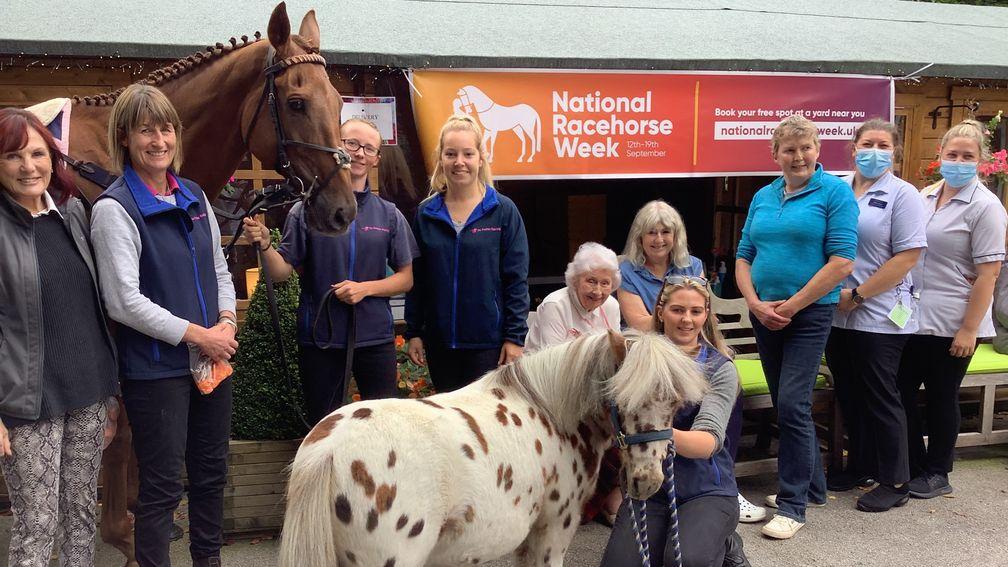
"If he's in a routine, he goes stale," she says. "A horse of his demeanour needs variety. The mind is as important as the physique.
"To his owner, Mrs Verity, he's more than just a racehorse. She loves the fact her horse can offer so much; he's part of her family and for him to be able to do this is an added bonus."
Foster believes there are plenty of others who could spread racing's message.
"Most trainers have a Sigurd in their yard, one they know would be all right doing visits," she says. "It's a simple idea and there is no downside; it benefits everybody."
This is the first of our features we are running during National Racehorse Week. Read more content here:
National Racehorse Week to start on Sunday but Epsom and Malton cancelled
'There's still a stigma' - racing charity intent on mental health training

Stay ahead of the field with 50 per cent off the ultimate racing subscription. Enjoy the Racing Post digital newspaper and award-winning journalism from the best writers in racing. Plus, make informed betting decisions with our expert tips and form study tools. Head to the subscription page and select 'Get Ultimate Monthly', then enter the code WELCOME22 to get 50 per cent off your first three months. First three payments will be charged at £17.48, subscription renews at full monthly price thereafter. Customers wishing to cancel will need to contact us at least seven days before their subscription is due to renew.
Published on 11 September 2022inFeatures
Last updated 15:10, 12 September 2022
- Government says it is working 'at pace' to have white paper measures in force by the summer
- 'The only thing you can do is lie fallow and regroup' - Meades to return with scaled-back operation following blank period
- The Gambling Commission has launched its new corporate strategy - but what are the key points?
- 'It was tragic it happened to Paddy but it was a good thing for the jockeys who followed - good came out of bad'
- Acquisitions, exits and retail resilience - what we learned from Flutter and 888's results
- Government says it is working 'at pace' to have white paper measures in force by the summer
- 'The only thing you can do is lie fallow and regroup' - Meades to return with scaled-back operation following blank period
- The Gambling Commission has launched its new corporate strategy - but what are the key points?
- 'It was tragic it happened to Paddy but it was a good thing for the jockeys who followed - good came out of bad'
- Acquisitions, exits and retail resilience - what we learned from Flutter and 888's results